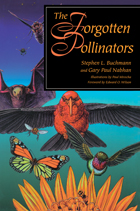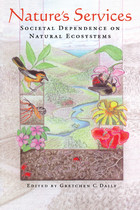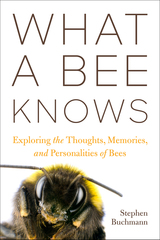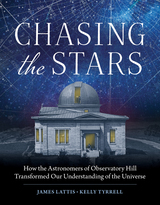
Consider this: Without interaction between animals and flowering plants, the seeds and fruits that make up nearly eighty percent of the human diet would not exist.
In The Forgotten Pollinators, Stephen L. Buchmann, one of the world's leading authorities on bees and pollination, and Gary Paul Nabhan, award-winning writer and renowned crop ecologist, explore the vital but little-appreciated relationship between plants and the animals they depend on for reproduction -- bees, beetles, butterflies, hummingbirds, moths, bats, and countless other animals, some widely recognized and other almost unknown.
Scenes from around the globe -- examining island flora and fauna on the Galapagos, counting bees in the Panamanian rain forest, witnessing an ancient honey-hunting ritual in Malaysia -- bring to life the hidden relationships between plants and animals, and demonstrate the ways in which human society affects and is affected by those relationships. Buchmann and Nabhan combine vignettes from the field with expository discussions of ecology, botany, and crop science to present a lively and fascinating account of the ecological and cultural context of plant-pollinator relationships.
More than any other natural process, plant-pollinator relationships offer vivid examples of the connections between endangered species and threatened habitats. The authors explain how human-induced changes in pollinator populations -- caused by overuse of chemical pesticides, unbridled development, and conversion of natural areas into monocultural cropland-can have a ripple effect on disparate species, ultimately leading to a "cascade of linked extinctions."

Life itself as well as the entire human economy depends on goods and services provided by earth's natural systems. The processes of cleansing, recycling, and renewal, along with goods such as seafood, forage, and timber, are worth many trillions of dollars annually, and nothing could live without them. Yet growing human impacts on the environment are profoundly disrupting the functioning of natural systems and imperiling the delivery of these services.
Nature's Services brings together world-renowned scientists from a variety of disciplines to examine the character and value of ecosystem services, the damage that has been done to them, and the consequent implications for human society. Contributors including Paul R. Ehrlich, Donald Kennedy, Pamela A. Matson, Robert Costanza, Gary Paul Nabhan, Jane Lubchenco, Sandra Postel, and Norman Myers present a detailed synthesis of our current understanding of a suite of ecosystem services and a preliminary assessment of their economic value. Chapters consider:
- major services including climate regulation, soil fertility, pollination, and pest control
- philosophical and economic issues of valuation
- case studies of specific ecosystems and services
- implication of recent findings and steps that must be taken to address the most pressing concerns

Although their brains are incredibly small—just one million neurons compared to humans’ 100 billion—bees have remarkable abilities to navigate, learn, communicate, and remember. In What a Bee Knows, entomologist Stephen Buchmann explores a bee’s way of seeing the world and introduces the scientists who make the journey possible. We travel into the field and to the laboratories of noted bee biologists who have spent their careers digging into the questions most of us never thought to ask (for example: Do bees dream? And if so, why?). With each discovery, Buchmann’s insatiable curiosity and sense of wonder is infectious.
What a Bee Knows will challenge your idea of a bee’s place in the world—and perhaps our own. This lively journey into a bee’s mind reminds us that the world is more complex than our senses can tell us.
READERS
Browse our collection.
PUBLISHERS
See BiblioVault's publisher services.
STUDENT SERVICES
Files for college accessibility offices.
UChicago Accessibility Resources
home | accessibility | search | about | contact us
BiblioVault ® 2001 - 2024
The University of Chicago Press









